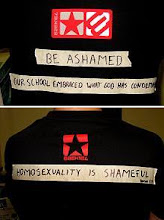When a student who disapproves of homosexuality wears a T-shirt that reads, "Be Happy, Not Gay," or "Homosexuality is Shameful", is that student a) exercising religious beliefs; b) enjoying the right to free speech; or c) infringing on the rights of others? At what point does a provocative or unpopular message become disruptive, harassing or even "hate speech"?
Schools are permitted and required to maintain order, and if there is a bona fide disruption, then schools can or should take action. Short of a disruption, can or should the school proactively take any action? What "dress code" regulations might withstand First Amendment scrutiny? Many have failed.
There is no "Hate Speech" exception to the First Amendment. But when does an unpopular message meet the narrow definition of "fighting words", the exception to the First Amendment prohibition against "content-based" or "viewpoint" discrimination?
No harassment can result if the shirt is worn in private (If a tree falls in a forest and no one is around to hear it ...). And most likely, no harassment can result if the shirt is worn in a gathering that includes only like-minded individuals. But what happens when it is worn to school and a student, staff or administrator complains?
Is it possible or even laudable to limit "life-style disapproving" speech, given that censorship of unpopular opinions is forbidden by the First Amendment? How can education, rather than official intervention, better achieve peace on Earth?
Wednesday, September 24, 2008
Thursday, July 31, 2008
On Cultural Icons: The Five Fuwa, or Olympic "Friendlies"
I suspect these five strange creatures are not Beijing's Olympic mascots as they pretend to be, but aliens from a toddler planet.
Creating official Olympic mascots is a complex project -- politicians and artists make strange bed fellows. Chinese folk artist Han Meilin (known as "Picasso" in the East) begged to be relieved of the assignment after over 1000 attempts to satisfy The Committee. The end result, however, is memorable, and provides ample fodder for satire and derision (recall the "Whazit" from the 1996 Atlanta Games). As the mother of a 6 year old who survived the teletubbies and is surrounded by Pokemon, I find it hard to deny the "Friendlies'" surrealistic appeal.
Creating official Olympic mascots is a complex project -- politicians and artists make strange bed fellows. Chinese folk artist Han Meilin (known as "Picasso" in the East) begged to be relieved of the assignment after over 1000 attempts to satisfy The Committee. The end result, however, is memorable, and provides ample fodder for satire and derision (recall the "Whazit" from the 1996 Atlanta Games). As the mother of a 6 year old who survived the teletubbies and is surrounded by Pokemon, I find it hard to deny the "Friendlies'" surrealistic appeal.
Subscribe to:
Comments (Atom)






